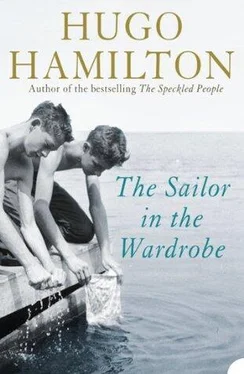On the morning of my birthday, before he went to work, he helped me to get up on the stilts in the hall. I had to lean with my back against the wall to get myself up onto them, and then I was suddenly looking down at my father smiling below me, telling me to give it a go, even though I was nervous of falling off. He was clearing the way so that I could walk through the hall, taller than anyone else in the house.
Next day, the war in our house came to an end. I apologized to my father, because I hated to see his hurt mind and my own hurt mind. I didn’t ever want to see him breathing hard again. He was outside with the bees buzzing around him and when he came in and took the cage off his head, I told him it was my fault and I would be on his side from now on. I was going to keep his rules. It was peace at any price now. My mother negotiated another amnesty and the house returned to normal. We were all friends again and I had a pact with my mother, to keep my father happy, to escape in more creative ways that would not hurt him.
Some days after that, Stefan returned without warning. Out of the blue, he appeared as if he had never even been away and no time had gone by. I came back from the harbour and heard his voice in the house, like the voice of a ghost who had returned from the dead. I walked into the breakfast room and Stefan was sitting there, with my mother and my brothers and sisters all looking at him as if they couldn’t trust their eyes. The brother we lost, the un-dead brother returned home.
At first there was more trouble because he had made everybody worry so much and my mother kept asking him how he could have been so thoughtless not to have sent at least some word home that he was alright. Stefan was annoyed when he heard that his name had been read out on the news and that he was classified as a missing person. Of course he went missing, but there was no need to go to the police, because he was only touring around for the summer and he didn’t want to think about home. When my father got back from work, I could see that he was furious and it looked like he preferred Stefan to be still missing.
‘How dare you come back like this?’ my father said. He was speaking to Stefan the way he speaks to me. It looked as if my father was going to hit him like he attacked me in the middle of the night.
‘We thought you were dead,’ my mother said. ‘Stefan, your mother was here, crying.’
Stefan went silent. It looked like he, too, was sorry he came back and felt like getting up and leaving again, maybe getting lost for ever this time. My father was waiting for him to apologize for causing so much trouble, as if that was all people ever had to do for the rest of eternity, to keep on apologizing to each other.
‘I was trying to find myself,’ Stefan said.
Maria could not stop herself from giggling, a spontaneous burst that came out through her nose, but my father said there was nothing to laugh about. He stared at Stefan and said it was a fresh answer. It was an insult to come back to our house and speak in such an impertinent way. The funny thing was that I think Stefan actually meant what he was saying, that he really was trying to find himself, because he had lost contact with the real world.
‘We have imagined him back to life again,’ my mother said.
She went over to Stefan and put her arm around him. She said our prayers were answered and we were so happy that nothing happened to him. It was a cause for celebration. First of all, Stefan would have to make a telephone call home to his mother and tell her that everything was alright. Then Stefan was going to have to eat something decent because he looked so thin. We would have to feed him properly before he went back home to Germany. My father forgot his anger and at dinner, Stefan told us about all the places he had been to, down in County Clare, listening to music and fishing with some of the men in the villages. From there he travelled through Mayo, through bogs that were like purple rugs, places where you thought you were the last man alive on Earth. In Sligo, he met young people from Belfast who brought him up North and we were all amazed that he was not afraid to go up there with all that was happening, the car bombs and the riots and the shootings. He said he sat in small pubs with people who were singing songs and learned some rebel songs himself. He said they played guitars like they were machine guns. A hippy song called ‘Massachusetts’ had been turned into an anthem of freedom fighting. They even took him to a riot and he threw stones at British armoured cars passing through the streets. He said he would never forget the sound of a stone against the green steel of a military Land-Rover.
Stefan got up and went out to find something in his rucksack. When he came back to the table he had a black object in his hand, which he then passed along to my mother.
‘I was nearly hit by that,’ he said.
‘What is it?’ my mother asked.
‘It’s a rubber bullet.’
My mother examined it. She had never seen anything like it before and held it as if Stefan had truly come back from the dead.
‘You could have been killed,’ she said.
She felt the weight of it in her hand. Everybody crowded around her to see for themselves. A souvenir of war. The souvenir from the world of rules and repression. I saw that it had a dent in the material and Stefan explained how it had hit the wall of a red-bricked house right behind him. He had heard the sound of it swishing through the air. We understood how lethal these plastic bullets could be because a boy had been killed only recently on the streets of Belfast by one of them. We passed the rubber bullet around and my father examined it thoroughly without saying a word.
‘It’s an improvement,’ my mother said, but then she suddenly laughed and nobody could understand what she meant by that. ‘It’s an improvement on real bullets.’
Stefan said that was a good way of looking at things, from the opposite direction, from underneath.
‘If it kills less people, then I suppose it must be an improvement,’ he said.
And then we were all laughing around the table, and even my father joined in and said rubber bullets were a great invention because they saved lives. He handed it back to Stefan so he could put it away in his rucksack. My mother told him not to show it to his own mother because it would upset her very much to see it. She asked Stefan what his plans were, whether he was going to go back home now. Stefan said he had been to the Aran Islands. He had sat on the cliffs overlooking the Atlantic. You could go no further, he told us, and now it was time to turn back.
‘You’re not a missing person any more,’ my mother said. She embraced him again as if he was her own son.
Stefan stayed with us for a few days more before going back to Germany. I went swimming with him, back to the secret place behind the terrace of white houses. I told him about the fight at the harbour. I told him about the fight with my father as well, and then he started telling me that before he left, he had hit his father and knocked him to the ground in the garden. He could still see him lying there, unable to get up with his injured knee. He told me that he walked away without helping his mother to pick him up, but now he felt sorry about that and wanted to go home and put all that right again because that injustice which he had done to his own father had begun to haunt him as much as the story which had been passed on to him from the war. He was going back because he and his father were part of the same history. It had not been possible to separate himself from that. He had lived in fear of making the same mistakes and now he wanted to be able to trust himself, to be free to make his own mistakes.
When he was leaving, my mother packed his bag with packages of barm brack for the journey. She was so excited about him going home alive, like a son returning after the war, that she had tears in her eyes, even while she was smiling. At the last minute, when Stefan was already standing at the door, she took out the ancient book from the time of Gutenberg and showed it to him. She had it ready for him wrapped in a thin blue see-through paper. She could hardly speak and without thinking about it, she put it into Stefan’s hand. He had to take his rucksack off again to stow it away safely, wrapped up in that see-through paper, then placed inside a brown envelope and finally wrapped in a jumper to make sure it would not be damaged. She wanted him to take it home. She was determined that it should go back to Mainz now. It was one of the few things that survived the war and she wanted him to carry this ancient book with him because maybe Germany is where it was needed most from now on. She wanted to repeat all the help she had given people during the bad years. She wanted to make sure that it was all done without any payment. She wanted to return the book, not because she thought it didn’t rightly belong to her, but because she refused to benefit in any way from a time of killing and hunger. She told Stefan to be very careful not to lose it, because it was very precious and would remind him that time goes back a long way.
Читать дальше
Конец ознакомительного отрывка
Купить книгу












